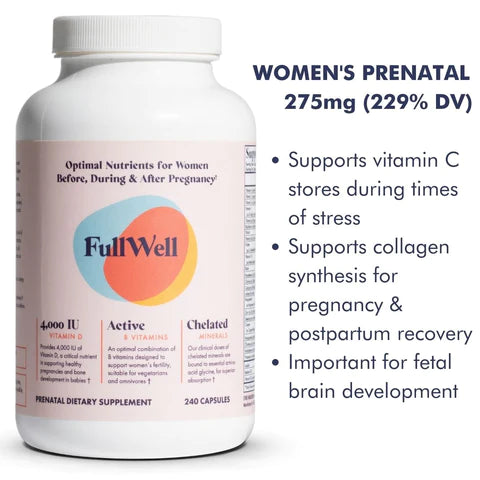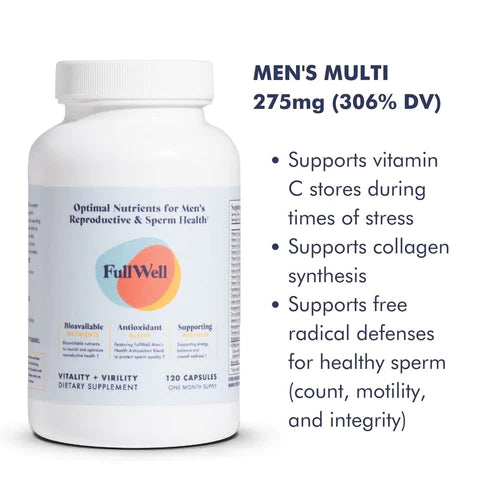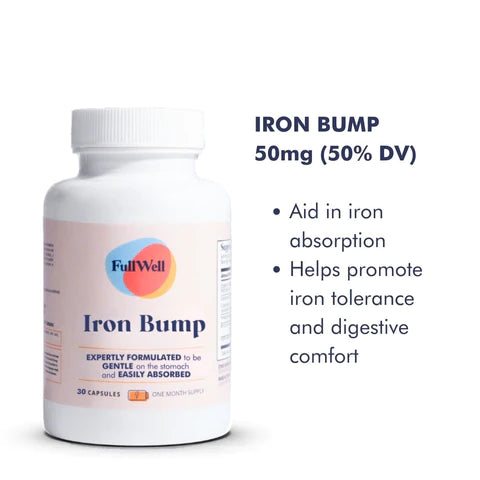Iron and Pregnancy
Read more

But before we dive into all that, let’s ensure we’re on the same page about vitamin C’s function and importance, particularly concerning those trying to conceive, pregnant, or breastfeeding.
Great question! Vitamin C is one of those nutrients we have heard about since we were kids (often in the same breath as “eat your fruits and vegetables”), but most of us aren’t sure why the body must function.
Vitamin C is an important antioxidant and co-factor for mom and baby. It helps reduce oxidative stress and supports your body’s free radicals. Oxidative stress is an imbalance of free radicals and antioxidants in the body.
Unfortunately, given our modern environments, it is almost impossible to avoid all oxidative stress (1). So, while we can’t wholly avoid it, it’s essential to address sources of oxidative stress in every aspect of your life to help restore this balance, especially if fertility is your current focus.
Before you get nervous, yes, we are all exposed to toxins like pollution, plastics, pesticides, etc., but there are many ways to incorporate simple lifestyle changes to reduce exposure. That’ll make vitamin C’s giant job a little easier!
You see, vitamin C is involved in a large swath of body processes. It plays a role in healing wounds and infections and is needed to make collagen, a fibrous protein in connective tissue that supports nerves, immunity, bones, cartilage, and blood (2).* In fact, collagen is crucial for the structural integrity of the placenta (3). As if that job wasn’t important enough, vitamin C also helps make several hormones and chemical messengers used between the brain and nerves and maximizes the antioxidant benefits of vitamin E by regenerating it from its oxidized form (4, 5).*
While it can be possible to meet your vitamin C needs through diet alone, eating more - not less - is best, especially while trying to conceive, pregnant, or breastfeeding.* During pregnancy, you can overdue it with excessive doses of vitamin C, and would aim to keep it under 20000mg daily. Nevertheless, it’s important to keep in mind that vitamin C is water-soluble, and depending upon your needs, your body will only absorb what it needs and excrete the excess amounts through urine.



The controversies all revolve around sourcing and production practices.
Like most nutrients, vitamin C, or ascorbic acid, can be found in nature or created synthetically in a lab. If you’re wondering which is better as a rule of thumb, I’m afraid that answer is not super simple: check out my thoughts on natural vs. synthetic supplements to learn why. But in the case of our Women’s Prenatal and Men’s Multivitamin, the choice regarding the form of vitamin C that I wanted to use was straightforward. I went with an ultra-premium synthetic version of ascorbic acid. We chose a whole-food vitamin C source from acerola cherry for our Iron Bump because the amount needed for iron absorption is less than in our complementary prenatal and multivitamin.
Getting the evidence-based suggested amount in each capsule can be challenging with whole foods supplements. Vitamin C is an excellent example of this. Whole-food vitamin C sources can be problematic due to the massive amount of whole-food material you must include to achieve evidence-based doses of vitamin C. For our Women’s Prenatal, the serving size would increase by two capsules or more!
Several myths are circulating around how synthetic vitamin C from ascorbic acid is produced and incorporated into supplements. Frankly, from where I stand, considering how we make our Women’s Prenatal and Men’s Multivitamin, it’s the product of misinformation and emotional reactions coming together, growing bigger and bigger, and veering further and further away from the truth. We’ve heard three significant concerns from our customers:
The ascorbic acid is not produced from genetically modified corn. This would cause concern, as many consumers avoid corn. The confusion comes from the 2-step fermentation process, which begins with glucose, or sugar, used in raw material form. This glucose can come from any sugar-bearing plant, so I understand the desire to be extra cautious, especially for those with food allergies or sensitivities to corn.
We do use this 2-step fermentation process. However, the end product that goes into FullWell contains no corn. We verify this by 1) testing the raw ingredient we use and 2) testing the finished product.
As far as the mold theory goes, there is no ascorbic acid that we are aware of that is fermented from black mold, and certainly not the ascorbic acid we use! But I have a hunch as to the origins of this valid concern.
Aside from the 2-step fermentation process, there are newly developing fermentation processes within the industry, including one that utilizes wild strains of fungal microbes, like Aspergillus niger, to produce ascorbic acid. This is the controversial “mold” that most people reference on the internet and social media. Since the current process of creating ascorbic acid (that 2-step fermentation process) is more energy intensive, researchers are trying to find ways to make a single-step fermentation process. One method is putting agricultural waste to work (like citrus peels tossed out while creating juice). In this process, A. niger strains are converted to L-galactonic acid, which can then be converted to L-ascorbic acid. Why this method? L-Galactonic acid is an expensive chemical, so using citrus peels that would otherwise go to waste could theoretically be cheaper for ascorbic acid production overall (9). However, to reiterate, this is not FullWell’s manufacturing process. This is a new technology that I will need to see many more studies and information on before I could even consider using it. Also, this is why it’s so important to have 3rd party testing be part of our routine. We are proud to set some of the highest standards for quality in the supplement industry.
Our process involves fermenting sorbitol using strains of microbiota that can convert sorbitol efficiently into vitamin C. These are safe and not present in the finished product. While I hate to sound like a broken record, we know this because we independently test and then 3rd party test every lot for harmful microorganisms, including molds. We would never release a product that didn’t pass with flying colors. I threw out the entire first run of prenatal when I started FullWell because it didn’t meet my standards. Of course, I lost time and money, but I couldn’t imagine putting anything on your shelf that wasn’t 110% pure quality. That’s the FullWell way.